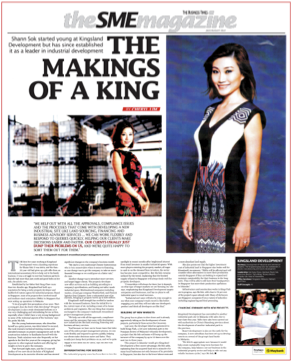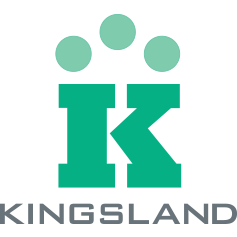The Makings of a King
By Cheryl Lim, SME Magazine
July / August 2012 Issue

The first few years working at Kingsland Development were a daunting experience for Shann Sok. It was 2004, and the then-23-year-old had given up a job offer from an international accountancy firm to help out in the family business. It was a struggle to convince business partners that she had more than just youth and good looks on her side, she admits now.
Established by her father Sok Hang Chaw more than two decades ago, Kingsland had built up a reputation for being a niche property developer and landlord of custom spaces for individual purposes. Based in Singapore, most of its projects then involved small and medium-sized enterprises (SMEs) in Singapore that were setting up operations in Malaysia.
"A lot of people's first perceptions of me were: 'She's a young girl, does she know what she's doing?" (property development) is also a male-dominated industry so it was very challenging and intimidating for me at first, especially when I didn't have a very strong background in some of the technical aspects of the business." says the petite Ms Sok.
But the young businesswoman, who describes herself as a gutsy person, was determined to succeed. She took intensive technical training courses and attended seminars on project management and on the construction industry to familiarise herself with the business. Trade missions were also frequently on her agenda in the first few years at the company, giving her exposure to other regional markets and offering her insight on how to grow the company.
Fast-forward eight years, and the 31-year-old mother of two now sits at the helm of Kingsland Development as its executive director and has steered significant changes to the company's business model.
"My dad is very traditional Chinese businessman who is very conservative when it comes to financing, so one change was to get the company to take on more financial leverage so we could grow at a faster rate," she says.
Another change was to introduce more services and target bigger clients. The property developer now offers services such as building according to a company’s specifications, and leasing out tailor-made industrial space. Multinational companies including marine, oil and gas company Weatherford, and Finnish logistics firm Cargotec, form a substantial part of its clientele, bringing in projects worth up to $20 million.
Kingsland’s staff strength has swelled in tandem with the increased business, from the initial five to the current team of 40, including a team of in-house architects and engineers. But one thing that remains unchanged is the company’s trademark streamlined project management process.
“We help out with all the approvals, compliance issues and the processes that come with developing a new industrial site like land sourcing, financing and business advisory services.
“And because we have our in-house team that takes care of the entire project management process, we can work flexibly and respond to queries quickly, helping our clients make decisions easier and faster. They usually just dump their problems on us, and we’re quite happy to sort them out for them,” says Ms Sok with a laugh.
DIFFERENTIATING FOR SUCCESS
The industrial property scene has been thrown into the spotlight in recent months after heightened interest from retail investors in smaller industrial spaces. With more players entering the property market, all eager to cash in on the demand from investors, the sector has become more competitive. But Ms Sok remains unfazed by the trend, explaining that the limited supply of land in Singapore will always bode well for property developers.
“Competition will always be there, but it depends on what type of target markets we are focusing on,” she says, emphasising that Kingsland Development targets companies and businesses, and has no plans to sell industrial space to retail investors.
“Industrial end-users will also be wise enough to see what your company’s track record is like before engaging you, and they will not take one developer’s product and think all developers are like that.”
BUILDING UP NEW MARKETS
The group has no plans to slow down and is already aggressively taking on the development of more projects, particularly those across the Causeway.
Last year, the developer inked an agreement to build Kings Park, a 130 acre industrial park in the Nusajaya district of Malaysia’s Iskandar development, a project that Ms Sok estimates will bump up the turnover of the company by up to 10 times over the next two to three years.
This project in Iskandar would give Kingsland Development a first-mover advantage, Ms Sok adds, explaining that the acquired land site is attractive for many local businesses not only because of its proximity to Singapore, but also due to the lower labour costs and a more abundant land supply.
She also points out that the higher investment cost of industrial land in Singapore also bodes well for Kingsland’s investment: “SMEs will be affected and will consider other alternatives to move their production outside Singapore if they are looking to expand and maintain sustainability for their business in the long term. They will be able to still have their headquarters in Singapore but move their production operations to Iskandar.”
Infrastructure and construction works in Kings Park are in progress, says Ms Sok, with close to 70 per cent of the project’s space already sold. Many of the buyers are Singapore companies from a variety of industries including engineering and food processing.
CHARGING FORWARD WITH NEW PROJECTS
Kingsland Development has committed to another industrial park site in Malaysia with sales due to start later this year. Talks have also been carried out with authorities in China’s Shandong province about the development of another industrial park in the province.
Resort development is also on the cards for the company. A new subsidiary has been set up to develop resorts on several of the group’s land banks in Malaysia.
“We felt it’s appropriate now because it would help create sustainable long-term business for the company, help balance out our business in the industrial property sector and help us ride out any volatile business cycles,” says Ms Sok.
SME Magazine © Singapore Press Holdings Limited. Reproduced with permission.

